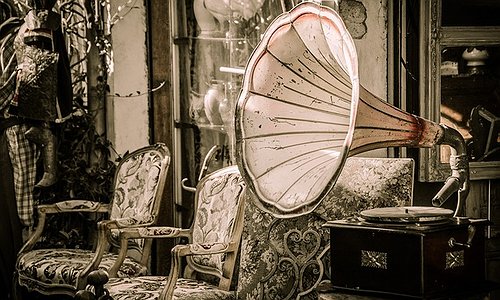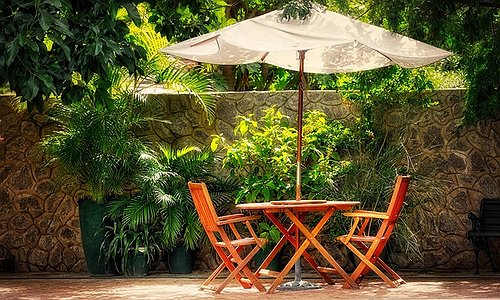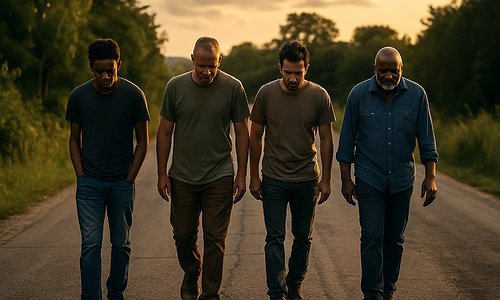The forgotten ones: life in the platteland during lockdown
March 23, 2020: Ah, I remember that day. I had just completed a particularly satisfying session of writing at my antique office desk, which I have strategically placed at the window overlooking the street so that I can keep an eye on the neighbours.

No deadline in the world will keep me from partaking in life’s simple pleasures which, in my homely platteland town, are often derived from the latest local scandal, the unexpected visitor at the next house, and the wistful imaginings of what these innocent interactions might actually be concealing.
There are other pleasures as well: the blissful quietude of country life, the clear air only sometimes disturbed by a passing aeroplane, the chirruping of birds darting along the tidy flowerbeds that line the street, the smiles of passing children as they busily discuss their day.
As the high Karoo sun began to deepen on the horizon, I went to reward myself with a glass of wine and a cigarette, as every writer needs their vices, and prepared for President Ramaphosa’s much anticipated national address regarding the measures that would be taken to combat Covid-19.
At that stage, the coronavirus pandemic seemed like a distant tsunami washing over faraway shores, something which you look upon with much the same bewilderment as the first great drawing back of the ocean that is about to come crashing down on you.
We don’t own a television, as life in a small town is more entertaining than a hundred episodes of 7de Laan, so we tuned the draadloos to Radio Sonder Grense and heard, for the first time, that benign phrase that would turn ominous in later months: “My fellow South Africans…”
And so Lockdown Level 5 was instated to curb the inevitable effects of the coming pandemic, to flatten that curve, make way for hospitals to sufficiently prepare themselves for the expected surge in cases, and not least of all, to prevent us from partaking in our virus-spreading vices.
I replenished my wine stocks, counted my cigarettes, and settled in to weather the coming storm. Friends greeted each other for the last time, shared in hushed tones the implications of what fresh horrors might come, and went into isolation.

And here we are, the four-thousand-and-eleventyith day of lockdown in the platteland, and it feels much as if small towns like ours have been forgotten in the greater scheme of things, left to flounder with the dismal rural infrastructure, lack of resources, and the battered municipalities.
As part of the initiative, to take the full measure of the spread of the virus at that time, the government announced that national testing would soon be underway. Wonderful, I thought, to know who amongst us might in fact already be infected.
While the news is awash with reports of hotspots in Gauteng and the Western Cape, many forget that smaller concentrated communities such as ours, with a large elderly population and broad-reaching rural poverty, would be decimated by a pandemic such as this.
We were sent the official testing schedule and told that mobile clinics would be visiting us at home to conduct the rather unpleasant, brain-tickling nose swab. The day ticked over, and not a state nurse was to be seen.
After the fact it was relayed to me, via the more reliable mode of word-of-mouth, that the younger members of the community were meant to have themselves tested, while the official brief concerning the handling of the testing encouraged us to be tested at home.

So wat nou?
I was told that others had been tested elsewhere in the town, including my parents who live conveniently close to the state clinic, but my street appeared to be broadly overlooked. By the time I had clocked, the clinic informed me that the state testers had already left.
And this state of affairs has seemed to pervade the handling of lockdown in many rural areas. Perhaps because approximately 68% of our fellow South Africans reside in urban centres, the enactment of a successful lockdown has been left up to the community itself, which has always been very resourceful.
At 12 o’ clock every day the bells are rung at the local Dutch Reformed Church to indicate a prayer hour for those affected by the virus, which also serves as a useful daily reminder of the importance of lockdown and of the fact that we are, in fact, in a pandemic.
Where there is a lack of official communiqué regarding the existence of new cases, community message groups alert members about those infected by the virus, while others who have been exposed use these same groups to announce their self-quarantine and report any symptoms.
Apart from the tragic health implications of this dangerous virus on the most vulnerable members of our community, the economic effects of the lockdown are an ongoing source of debate across the country and can be clearly seen amongst the poorer demographics of the town.
As another example of rural resourcefulness, the church arranged for food parcels to be delivered to the most vulnerable amongst us, while local business owners quickly set up soup kitchens to deliver healthy meals to families who had suddenly been left without an income.
And so, we go on. While daily news outlets report on the state of the pandemic in cities across the country, rural areas such as ours don’t feature as readily in the narrative, while our broader community of farmers still operate as the breadbasket of the country.
But we don’t mind being forgotten, we have each other, waving to our neighbours from behind our windows, giving breathless greetings behind face masks in the small local grocer, and using those ubiquitous message boards to ensure that the skinner is never forgotten.
Editor: Anchen Coetzee
Written by: Naomi Roebert
Yes, we do exist: Millennials choosing the platteland over city life




